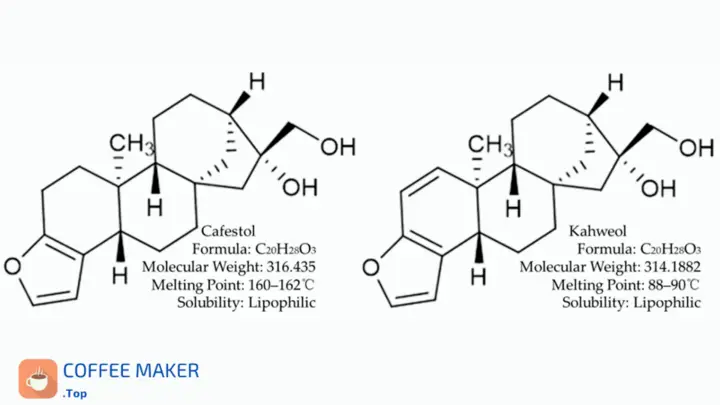After more than two years of publishing content about coffee pots and coffee, we have done so much research on its properties and health benefits that we also receive many questions about its contraindications and health detriments. One of the most common is whether coffee raises cholesterol levels.
Coincidentally, coffee is one of the most widely consumed beverages globally, and cholesterol is one of the most common health concerns of the adult population. Well, we have to say that the two are not necessarily related, although to refine the answer, it is first necessary to know some basic notions of chemistry and the organic composition of coffee.
The diterpenes of coffee
Almost all coffee drinks contain cafestol. What is cafestol? So basically, a molecule capable of raising the levels of cholesterol. It also, but to a lesser extent, contains kahweol. Both components, cafestol and kahweol, are diterpenes (so-called because of their chemical structure).

And it is precisely the coffee diterpenes that are primarily responsible for how coffee affects cholesterol.
However, these diterpenes are not always present in coffee in the same form or the same proportion. Their amount depends on the origin of the type of coffee bean and the preparation of the beverage.
Arabica beans contain both cafestol and kahweol, whereas Robusta beans contain half as much cafestol and hardly any kahweol.
NCBI (Mark V Boekschoten, Evert G Schouten, and Martijn B Katan)
About the extraction method, we mean that when we use coffee machines with filtration, we can retain part of these diterpenes in the paper filters. However, those methods in which the infused coffee goes directly into the cup will contain more diterpenes.
Therefore, in infused coffee, such as Turkish coffee or boiled coffee, there is no retention or filtering of coffee (it all ends up in the cup). So the rate of diterpenes in the coffee we drink with these methods is the maximum possible. This type of unfiltered coffee brewing increases LDL and triglycerides.
Decaffeinated coffee and cholesterol
A super interesting study in 2005 showed that decaffeinated coffee had more diterpenes than regular coffee. All this knowing that most of the decaffeinated coffees used in the study were of the Robusta variety, with fewer diterpenes than Arabica.
So all those consumers who drink decaffeinated coffee to get rid of caffeine inadvertently increase cholesterol levels. So, we have to weigh up what we would rather do, consume more caffeine or increase cholesterol levels. Perhaps the solution is to drink decaffeinated but filtered coffee.
NOTE: The information we provide is based on our study and research. Although we try to be as accurate as possible, please consult your doctor for further information if you have any doubts.
